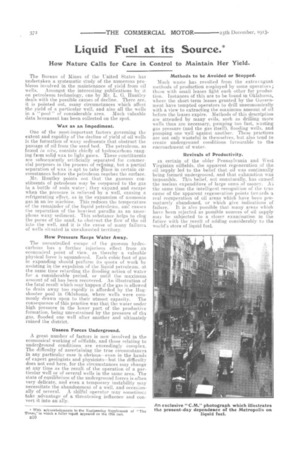Liquid Fuel at its Source.*
Page 4

If you've noticed an error in this article please click here to report it so we can fix it.
How Nature Calls for Care in Control to Maintain Her Yield.
The Bureau of Mines of the United States has undertaken a systematic study of the numerous problems involved in the maintenance of yield from oil wells. Amongst the interesting publications by it on petroleum technology, one by Mr. L. G. Huntley deals with the possible causes of decline. There are, it is pointed out, many circumstances which affect the yield of a particular well, and also all the wells in a "pool " of considerable area. Much valuable. data hereanent has been collected on the spot.
Wax as an Impediment.
One of the most-important factors governing the extent and rapidity of the decline of yield of oil wells is the formation of waxy sediments that obstruct the passage of oil from the sand bed. The petroleum, as found in situ, consists chiefly of hydrocarbons ranging born solid wax to light gases. These constituents are subsequently artificially separated for commercial purposes in the process of retning, but a partial separation of wax is apt to take 'Place in certain circumstances before the petroleum reaches the surface.
Mr. Huntley points out that the gaseous constituents of petroleum may he compared to the gas in a bottle of soda water ; they expand and escape when the pressure is relieved by a well, causing .a refrigerating effect, as in the expansion of ammonia gas in an ice machine. This reduces the temperature of the remainder of the liquid petroleum, and causes Ole separation of the heaviest paraffin as an amorphous waxy sediment. This substance helps to clog the pores of the sand, to obstruct the flow of the oil into the well, and it is the cause of many failure& of wells situated in unexhausted territory.
How Pressure Keeps Water Away.
The uncontrolled escape or the gaseous hydrocarbons. has a further injurious effect from an economical point of view, as thereby a valuable physical force is squandered. Each cubic foot of gas in expanding should perform its quota of work by assisting in the expulsion of the liquid petroleum, at the same time retarding the flooding action of water for a considerable period, or until the maximum amount of oil has been recovered_ An illustration of the fatal result which may happen if the gas is allowed to drain away too rapidly is afforded by the Hogshooter pool in Oklahoma, where wells were commonly drawn upon to their utmost capacity. The consequence of this practice was that the water under high pressure in the lower part of the productis,.e formation, being unrestrained by the pressure of tly: gas, flooded one well after another and ultimately ruined the district.
Unseen Forces Underground.
A great number of factors is now involved in the economical working of oilfields, and those relating to underground conditions are exceedingly complex. The difficulty of ascertaining the true circumstances in any particular case is obvious—even in the hands of expert geologists and physicists—but the difficulty does not end here, for the circumstances may change at any time as the result of the operation of a particular well or or several wells in the same area. The state of equilibrium of the underground forces is often very delicate, and even a temporary instability may necessitate the abandonment of a well, and occas;on ally of several. A skilful operator may sornetirtice take advantage of a threatening influence and convert it into an ally.
Methods to be Avoided or Stopped.
Much waste has resulted from the extravagant methods of production employed by some operators ; those with small leases fight each other for produft tion. Instances of this are to be found in Oklahoma, where the short-term leases granted by the Government have tempted operators to drill uneconomically with a view to extracting the maximum amount of oil before the leases expire. Methods of this description are attended by many evils, such as drilling More wells than are necessary, pumping too fast, wasting gas pressure (and the gas itself) flooding wells, and pumping one well against another. These practices are not only wasteful in themselves, but also tend to create underground conditions favourable to the encroachment of water.
Revivals of Productivity.
in certain of the older Pennsylvania and West Virginian oilfields. the apparent regeneration of the oil supply led to the belief that oil was continually being formed underground, and that exhaustion was impossible. This belief, not unnaturally, has caused the useless expenditure of large sums of money. A.; the same time the intelligent recognition of the true cause of the apparent regeneration points towards a real recuperation of oil areas which have, been prematurely abandoned, or which give indications of
failure. It is also possible that many areas which have been rejected as possible sources of oil supply may be subjected to a closer examination in the future with the. result of adding considerably to the world's store of liquid fuel.




















